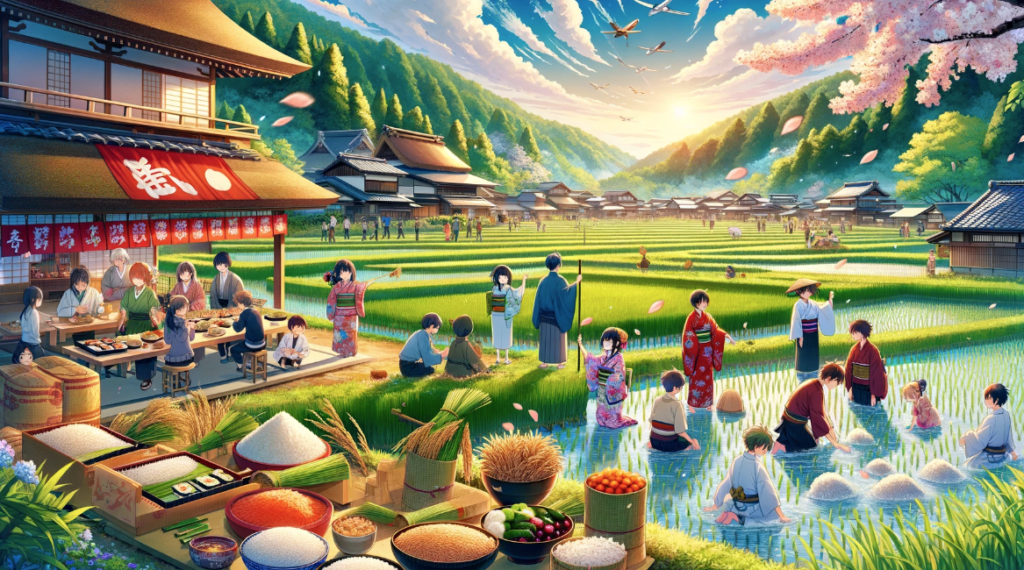
Lesson 27 Rice Cuisine and Culture
Topic Question: Can you explain the importance of rice in Japanese cuisine and culture?
No. 1: Introduction- First, try answering the question yourself.
The instructor will provide advice on vocabulary, grammar, and expression corrections.
Sample Answer – Let’s read aloud. Instructor will check your pronunciation and accent.
Rice is not merely a staple food in Japan; it is a fundamental element of the nation’s cuisine and culture. Historically, rice cultivation has shaped the Japanese landscape, economy, and society. In cuisine, rice is the heart of many meals, served as plain steamed rice, sushi rice, or in various other dishes like onigiri (rice balls) and mochi (rice cakes). Culturally, rice holds a sacred place, evident in rituals and festivals like the New Year’s mochitsuki (rice-pounding ceremony) and in offerings at Shinto shrines. Rice symbolizes prosperity, purity, and renewal, reflecting its ingrained status in Japanese identity and traditions.
No. 2: Vocabulary Building- 5 Words to Learn and Their Meanings
- Pronounce the Words Correctly (Pronunciation Training) + Make Sentences Using the Words Instantly
- Staple (主食, shushoku): A primary or basic food item that is eaten regularly and in such quantities as to constitute a dominant portion of the standard diet.
“Rice is the staple food in Japan, essential to the daily diet of its people.”
- Cultivation (栽培, saibai): The process of trying to acquire or develop a quality or skill.
“The cultivation of rice has deeply influenced the cultural landscape and agricultural practices in Japan.”
- Sacred (神聖, shinsei): Regarded with great respect and reverence by a particular religion, group, or individual.
“Rice is considered sacred in Japanese culture, used in various religious ceremonies and festivals.”
- Prosperity (繁栄, han’ei): The state of being prosperous; successful, especially financially.
“Rice symbolizes prosperity and is often used in rituals to wish for a bountiful harvest and general well-being.”
5.Renewal (新生, shinsei): The state of being made new, fresh, or strong again; the process of being renewed.
“The annual rice planting season is a time of renewal, marking a new cycle in the agricultural and cultural calendar.”
No. 3: Key Idiom and Example Sentences
“The salt of the earth” (地の塩) – Referring to someone or something that represents the best or most noble qualities of society.
“Farmers, who dedicate their lives to the cultivation of rice, are truly the salt of the earth, embodying hard work and dedication.”
“Rice, being fundamental to Japanese cuisine and culture, can be considered the salt of the earth within the context of its importance to the nation.”
No. 4: Discussion and Exchange of Opinions on the Sample Answer
Instructor: How do you think the importance of rice extends beyond food to influence social and religious practices in Japan?
Student: [Opinions of students]
No. 5: Free Discussion on the Topic
Let’s delve deeper into how rice has influenced Japanese culture and traditions. Consider the different varieties of rice and how they are used in Japanese cuisine. What are some regional specialties involving rice that highlight its cultural significance? Additionally, explore how modern trends in agriculture and diet are affecting rice’s role in Japanese society. How is the cultural reverence for rice being maintained or transformed in contemporary Japan?







